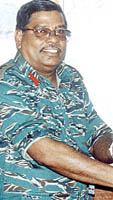Morawhanna outpost to be resuscitated
Commissioner of Customs and Trade Administration, Chabilall Ramsarup yesterday said wiping out corruption within the Guyana Revenue Authority (GRA) will require more rigorous surveillance at ports across the country and an end to inducements from the local business community.
Speaking to members of the private sector at a Georgetown Chamber of Commerce and Industry luncheon at Le Meridien Pegasus, he said that containers are leaving local ports loaded with cocaine and marijuana because of gaps in the system. He pointed to a recent incident in Jamaica where cocaine was discovered in a container on a ship that left Guyana. However, he noted that new policies are being adopted to curb such practices.

Ramsarup said corruption is affecting trade and “does not augur well for the country”. He said some of the new policies include strengthening ports across the country particularly at Charity, and also scrapping the practice of having exporters pack containers at weekends or outside of customs’ working hours.
Further, customs intends to introduce tags for goods on coastal flights and to police such flights on a regular basis. Ramsarup said people are currently allowed to board coastal flights without any custom checks, adding that baggage without any name tags are sometimes found on such flights, transporting illegal drugs.
There is a lot of illicit trade at Charity between Guyana and Venezuela, according to him. However, greater focus is to be placed in that area and also at Lethem, Kurupukari and Morawhanna. Ramsarup said GRA plans to resuscitate its base at Morawhanna, which has been out of operation for years.
Though he did not elaborate on the inducements being offered to customs officers by businesses, Ramsarup said the practice must come to an end. He told those gathered that the corruption would not exist if “people are not willing to aid it”.
He said GRA is in the process of restructuring and its intelligence gathering and enforcement units are to be strengthened. Ramsarup pointed out that enforcement needs to be stepped up and more work has to be done in its audit offices so as get a clearer idea of “which businesses to go after”.
Training is another area that the GRA has high on its agenda, Ramsarup said, adding that there has not been any technical training in years. Further, he said, they plan to train customs brokers since many are in need of refresher courses.
In response to a question posed about official invoices being rejected at GRA, Ramsarup said it is often difficult to tell them apart from the counterfeits. He pointed to the Fidelity Investment scam that was recently under investigation, stating that GRA was unable to tell that Fidelity’s invoices were counterfeit until they went over to Venezuela to check on the Polar beer suppliers.
“We had no idea that those invoices submitted by Fidelity were not official until we checked it out in Venezuela where the manufacturers are. We are always checking invoices when they come in because people do give us counterfeits,” he said.
With respect to constant delays at customs and clearing items from the wharves, he said, that the GRA has managed to reduce the number of days it takes to clear a container by at least four since February this year. He also said that if any new entry is made at Customs House and five days elapse without any movement businesses can approach him to look into the matter. Ramsarup said he has an open door policy, adding that he intends to work along with the public to ensure there are improvements at customs one step at a time.
He pointed to the Total Revenue Integrated Processing System (TRIPS) system that was implemented earlier this year when the Value Added Tax (VAT) was introduced stating that GRA is still experiencing some problems with it. According to him, officers are now learning to operate TRIPS and get it to work as planned. (Iana Seales)





